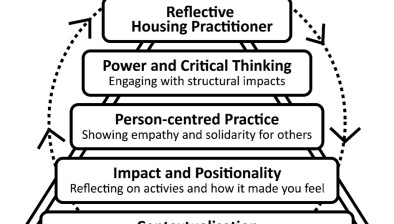Housing minister and chief planner issue end-of-year update

Kevin Stewart MSP
The minister for local government, housing and planning Kevin Stewart and chief planner John McNairney have written to stakeholders about progress and next steps for major planning workstreams including NPF4, Scottish Planning Policy, Scotland’s Digital Strategy for Planning, Permitted Development Rights and implementation of the 2019 Planning Act.
The letter also updates guidance on relaxing planning controls, where appropriate, during the pandemic.
The letter reads:
As 2020 is nearing a close, we are writing to update you on some of the work we have been doing across the Planning and Architecture Division this year and also to highlight some of our activities over the coming months in relation to the continuing wide reform of Scotland’s planning system. That includes progress towards Scotland’s fourth National Planning Framework, digital transformation, the implementation of the 2019 Planning Act and the increasing influence of planning in the creation of high quality, sustainable places.
It has of course been a very difficult year for so many reasons, bringing challenges for us across our personal, family and professional lives. Our planning system was no different and had to adjust, and we have been very pleased with the response, our collective willingness and ability to work together, and the agility of the system to make things work in trying circumstances.
While recent progress with the COVID-19 vaccination programme is hugely welcome and we may now be at the beginning of the end of this pandemic, we know for now the virus continues to pose real risks to life and that it is still restricting our lifestyles and our work. So we also take this opportunity to give an update on the temporary legislation and guidance, while we continue to navigate our way through the pandemic and ensure planning is playing an effective and vital part towards our recovery.
Maintaining a functioning planning system and supporting recovery
Back in the spring, the impacts of COVID-19 and the need for physical distancing led us to rethink our most immediate priorities. We did this in rapid collaboration with a number of stakeholders, and we are very grateful for the invaluable input we received.
Emergency legislation
You may be familiar with the suite of primary and secondary legislation from earlier in the year which made some important temporary changes to various aspects of the planning system. Those included: extending the duration of planning permissions that were about to expire; enabling online publication of planning documents instead of at physical locations; and suspending the need for public events in pre-application and plan consultation, which can instead be held virtually. All of this legislation has been extended so that it can continue to be utilised while still needed.
Additionally, a permitted development order temporarily grants planning permission for any necessary emergency healthcare-related facilities to deal with the current crisis, and so give certainty about their planning status. While that order was due to expire at the end of December, a further order was laid in the Scottish Parliament recently which will extend those permitted development rights until 1 July 2021.
The full range of emergency changes made to planning legislation this year have been, and remain, vital in enabling planning processes to continue. While they will remain in place for now, they also remain temporary and will come to an end when the time is right. We are of course keen to learn from experiences and to consider if any best practice is emerging from current arrangements that could be adopted in the longer term.
Relaxing planning control
In addition to that legislation, our letters of 11 March, 19 March, 3 April, 29 May and 2 July all included guidance which recognised the important and helpful role planning can play in enabling businesses and services to diversify and continue to operate during this difficult period. In the main, the most appropriate, straightforward and efficient way planning authorities can allow for reasonable temporary changes is by informally relaxing planning controls; particularly by using their discretion not to take enforcement action against planning breaches that are acceptable in the current circumstances.
While we could not produce an exhaustive list of what that means in practice, nor would we want to limit the reach of this relaxed approach, specific examples have included support for:
- the hospitality industry to provide outdoor seating and takeaway facilities
- food retail opening times and deliveries outwith their conditioned hours
- holiday parks to stay open beyond their usual seasons
- longer hours of operation on construction sites
We think this supportive, pragmatic and flexible approach has been reasonable, successful and appreciated. It continues to have a vital part to play in supporting the national response to COVID-19. Continued fair relaxation of planning control can help to maintain economic activity and keep people in jobs, and can also complement efforts to suppress the virus. So we are restating our earlier guidance and ask that planning authorities continue to exercise their discretion and allow for temporary breaches of planning control that are reasonable and support businesses to operate and enable services to be provided as safely as possible for our communities.
We will continue to keep this guidance under review over the weeks and months ahead, and it will remain in place until such time as we amend or withdraw it; which we will do after the requirements for physical distancing have been removed.
Safer Public Spaces
The Safer Public Spaces for Scotland Guidance was updated on 2 November. This guidance is primarily intended for owners and operators of public places and focuses on the design principles for safer urban centres and green spaces. It provides a framework for identifying the issues associated with the use of public places in light of the need for physical distancing, focusing primarily on areas likely to have high footfall, and includes temporary practical interventions for adapting and managing public places. The November update draws a link to Scotland’s Strategic Framework to suppress the virus and the levels-based approach to applying protective measures, and it complements other sectoral guidance.
The update also incorporated comments from stakeholders, including the Mobility Access Committee for Scotland, which highlighted the need to undertake equality impact assessments for changes to the built environment to ensure that equality groups, especially disabled people, are not disadvantaged. Earlier feedback from some groups, including visually impaired and those who require accessible parking spaces, had been that some temporary measures were disadvantaging them.
National Planning Framework 4 (NPF4)
Scotland’s fourth National Planning Framework is making progress and is a major exercise in collaboration and radical thinking. NPF4 is going to play a crucial part in the transformation of planning in Scotland, and in how we transition to a net zero agenda and meet our world-leading emissions reduction targets whilst also supporting a green recovery.
On 26 November, we published a Scottish Government Position Statement. It provides an update on our progress towards the preparation of NPF4 and sets out our current thinking, building on the wealth of evidence we received through our Call for Ideas exercise and early engagement activity earlier this year.
The Position Statement is not a formal part of the NPF process; nor is it a draft NPF4 and it does not have any formal status in the planning process. However, the impact of the pandemic on the overall timescale for NPF4 presented this extra opportunity to advance our thinking and inform further discussions before we produce a draft of the framework.
The Position Statement signals a significant shift in the way we think about planning and our places, and a move from the NPF3 focus on ‘low carbon’ towards a more ambitious ‘net zero’ agenda for NPF4. We have set out our current thinking over four key themes: net zero emissions; resilient communities; wellbeing economy; and better, greener places.
We hope you are finding the time to read and consider the Position Statement. We are inviting comments on the current thinking and the general direction of travel, which you are welcome to share with us through our consultation hub by 19 February 2021.
We have also updated the NPF4 Programme for Engagement, and this blog includes some details of engagement we have planned for the new year. We have provided some resources on our website transformingplanning.scot, including a presentation and accompanying notes, which we hope you will find helpful to update your colleagues, to stimulate discussion and to help inform any comments you wish to pass on to us. We would also draw your attention to the interactive map of national developments and update on indicative Regional Spatial Strategies that we published alongside the Position Statement.
We intend to lay the draft NPF4 in the Scottish Parliament in autumn 2021 and at the same time we will conduct extensive public consultation and stakeholder engagement on its contents. We anticipate that NPF4 will be adopted in spring 2022.
Scottish Planning Policy and housing
In the summer, we consulted on proposed interim changes to the Scottish Planning Policy, in advance of NPF4 being completed. We recognise the level of interest in the consultation and the wide-ranging views expressed. Today, we have published the Scottish Government’s response, which summarises the views we received, sets out available evidence and explains our finalised changes to the Scottish Planning Policy. We also published the updated Scottish Planning Policy, incorporating those changes.
Digital Strategy for Planning
On 24 November, we were delighted to launch Transforming Places Together: Scotland’s Digital Strategy for Planning. It sets out a framework for a world-leading digital planning system with a series of key missions to deliver that based on people, data, technology, working practices and a culture of innovation. Digital transformation has been a key element of planning reform from the start, integrating with the legislative changes for a planning system that helps connect people with their places, with well-informed decision-making and delivering positive change.
Digital transformation will put reliable, openly available data, technology and innovation at the heart of a planning system that we know will have some big decisions to make about our future places, and for our future health and wellbeing. There is also massive potential for digital to provide new ways to get people involved and have a meaningful influence in the future of their places.
We will follow up this strategy with a £35 million, 5-year transformation programme, which we will launch early next year. There are clear reasons why this is a vital investment. As the Royal Town Planning Institute has estimated, digital transformation could deliver a boost of up to £200m in economic benefits directly to users of the planning system, and wider financial benefits of up to £300m. And it has the potential to create up to 1,600 new jobs in the construction and development sector, and with costs to large house builders reduced by £25-30k per application.
To support the digital strategy, we have produced a suite of user-research evidence, resources and prototypes which you can see at transformingplanning.scot.
Planning (Scotland) Act 2019 implementation
While the impacts of COVID-19 and the need for physical distancing led much of our planned work this year on the implementation of our new Planning Act to be paused, we have made progress on a number of aspects of this work programme lately. We would like to take this opportunity to update on some recent activity and highlight the actions we have prioritised to progress in advance of next year’s Scottish Parliament election.
Earlier this week, we laid regulations in the Scottish Parliament covering the arrangements for the designation of short-term let control areas, as introduced by section 17 of the 2019 Act, alongside a related order for a licensing scheme for short-term lets. This follows a consultation carried out during the autumn. Subject to the approval of the Scottish Parliament, the Control Area Regulations and the Licensing Order will come into force on 1 April 2021.
We have been particularly determined that we progress those provisions of the Act which help people to be involved in shaping their future, to reduce conflict and build public trust; even more so having witnessed many examples this year of communities wanting to do their best for the future of their local areas. We consulted recently on improvements to pre-application consultation with local communities on national and major planning applications, and will lay regulations in the Parliament in the new year. And earlier this week, we published a consultation on draft guidance in relation to the use of mediation in planning, on which we are inviting responses by 12 March 2021. We will also consult early in 2021 on the detailed arrangements and guidance for community bodies preparing their own local place plans, so that there will be an opportunity for those plans to be able to influence the first round of local development plans in the new system.
We want those new local development plans to be able to get underway as soon as NPF4 has been adopted, so we will also progress to public consultation on our proposals for development plan regulations and guidance early next year.
Other aspects of the Act, including a number of changes to development management, the introduction of masterplan consent areas and the performance and training provisions, will not be implemented before next year’s election. We will provide a further update when we are able.
You can keep up-to-date on the planning reform programme, including consultations and emerging legislation, at transformingplanning.scot.
Review of Permitted Development Rights
We recently consulted on a first phase of new and amended permitted development rights, in which we have prioritised digital infrastructure, agricultural units, peatland restoration and development supporting active travel; due to their potential to support Scotland’s green recovery and remote and rural communities. Following careful consideration of the responses we received, today we have laid an order in the Scottish Parliament including new and extended permitted development rights in relation to those matters discussed in the consultation, and also on further changes relating to aquaculture developments.
We have proposed that the second phase of changes to permitted development rights will include support for our town centres to recover, drawing from the current review of the Town Centre Action Plan.
Place Standard
The Scottish Ministers promote the holistic approach of the Place Principle. It helps us to collaborate and achieve positive outcomes for people and places, supported with use of the highly successful Place Standard tool. This year especially, people understand that the quality and design of our places can have a major impact on our physical and mental health and wellbeing.
Working with our partners Public Health Scotland, Architecture & Design Scotland, the Improvement Service and Glasgow City Council, we have undertaken a refresh of the Place Standard, involving a number of improvements to the tool’s usability. This revised version of the tool will be launched alongside a new Place website early in 2021 to promote the benefits and positive outcomes from place-based working, including support for 20-minute neighbourhoods. This work will be complemented by new specific versions of the Place Standard tool to support design processes and improved engagement with children and young people.
Thank you
Finally, we want to say thank you for all you have done in very difficult circumstances this year, and we extend that also to our colleagues in the Planning and Architecture Division and elsewhere across the Scottish Government. It has been a tough year but there are good reasons for optimism going into 2021. We hope you will get an opportunity to rest and recharge over the coming weeks and we look forward to working together again next year.
Staying in touch
We hope you have found this update useful. Your feedback is very welcome, including on how we can improve our communication with you. Please send any thoughts you wish to share to chief.planner@gov.scot.









